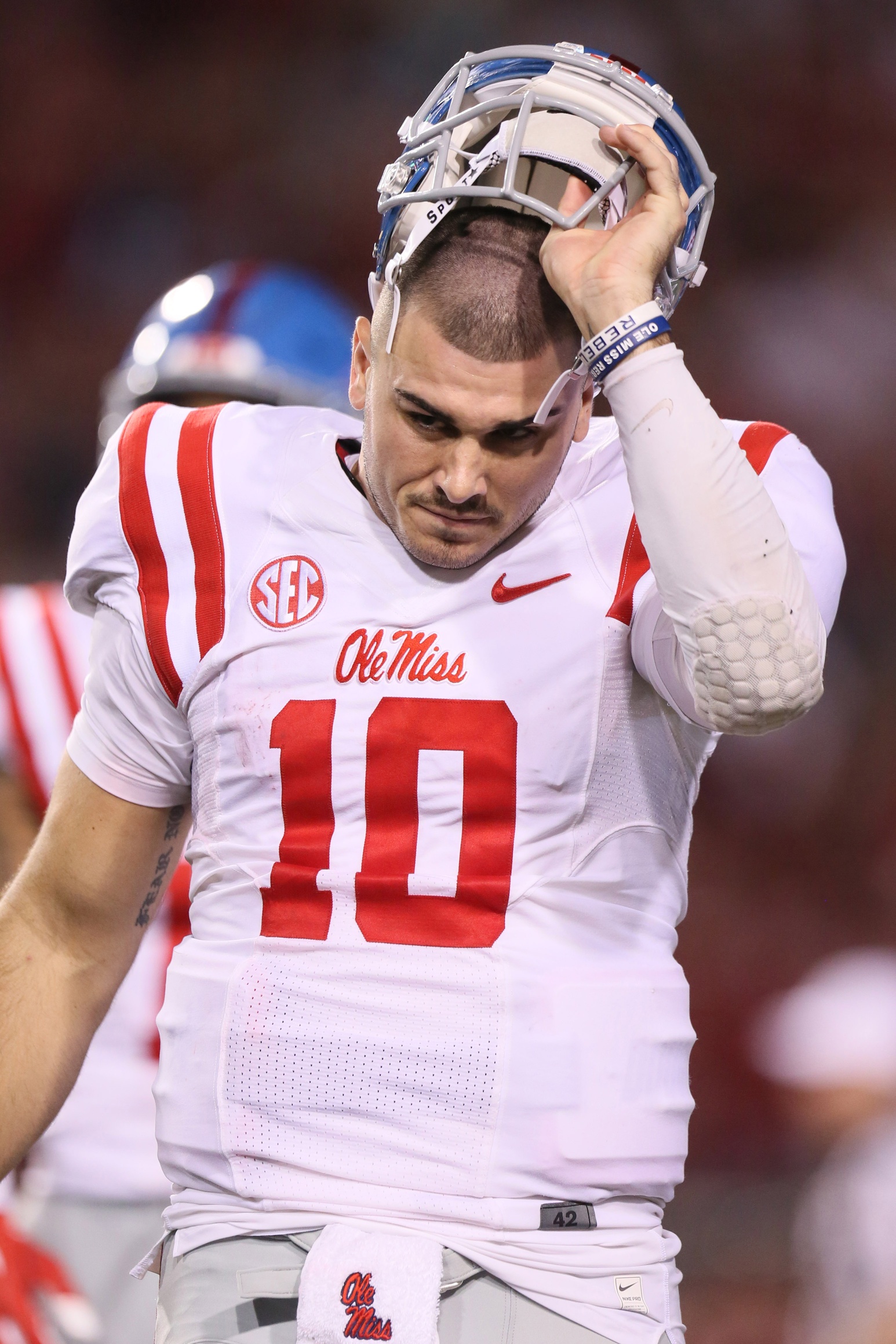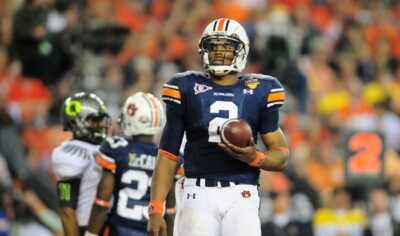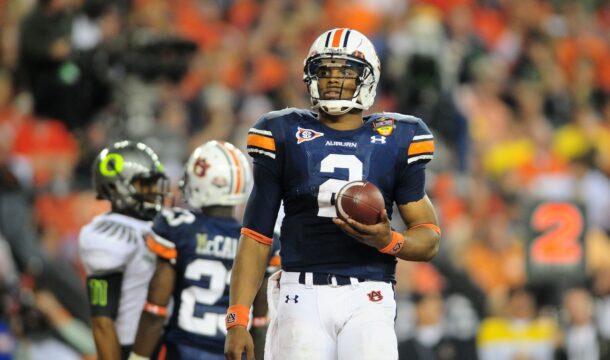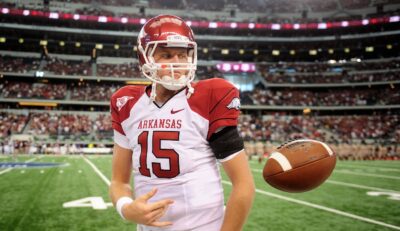
If history is any indication, ‘Mr. Irrelevant’ Chad Kelly won’t succeed in the NFL
By John Crist
Published:
Chad Kelly returned to Ole Miss as a senior to win the Heisman Trophy, compete for a national title and elevate his stock for the NFL Draft.
Instead, the former Rebel wasn’t even among the top quarterbacks in the land for 2016, let alone worthy of college football’s most prestigious individual award. Mississippi fell to 5-7 and didn’t qualify for a bowl game.
As a result, Kelly dropped in the draft all the way to No. 253 overall — the final selection, as a matter of fact — in Round 7 to the Denver Broncos. Projected by some draftniks as a potential first-round pick prior to last season, he’ll now forever be associated with one of the most dubious nicknames in sports: “Mr. Irrelevant.”
Without question, Kelly is the most high-profile player from the collegiate ranks to be selected as Mr. Irrelevant.
If history is any indication, then Kelly won’t have much of a career on Sunday and will hang up his spikes one day rather anonymously.
While the draft dates back to 1936, the first player to officially hold the title of Mr. Irrelevant was Dayton wide receiver Kelvin Kirk in 1976. He was the final choice in the 17th Round and went to the Pittsburgh Steelers.
Kirk was celebrated with Irrelevant Week in Newport Beach, Calif., where he took part in a golf tournament, a regatta and a roast. He was also awarded the Lowsman Trophy — a twist on the Heisman, it depicts a player fumbling the ball. The entire Mr. Irrelevant phenomenon was the brainchild of former NFL receiver Paul Salata.
Without question, Kelly is the most high-profile prospect from the collegiate ranks to be chosen as Mr. Irrelevant.
Kelly became just the third QB in SEC history to throw for 4,000 yards as a junior in 2015, when he also assembled a touchdown-to-interception ratio of 31-to-13 and led the Rebs to a 48-20 victory over Oklahoma State in the Sugar Bowl.

His senior campaign was a disaster, though. Even though he threw for a combined 734 yards against Florida State and Alabama in September, he was at least partially responsible for Ole Miss blowing big leads in both games — especially vs. the Seminoles, when he turned it over four times — and starting the season 1-2.
A three-game October losing streak effectively put the Rebels to bed once and for all. Kelly fired 5 TDs but also had 4 INTs.
If that wasn’t bad enough, Kelly tore his ACL the first weekend in November in a win over Georgia Southern. He finished 2016 on the sideline watching his replacement, freshman Shea Patterson, lose two of three starts.
Had Kelly entered the draft a year ago, even if he wouldn’t have been in the conversation for Round 1, his name likely would’ve been called somewhere in the middle frames. Not only did he possess an intriguing skill set on the field, but he seemed to have most past the off-the-field troubles that dogged him as a younger man.
Kelly was the last of 10 signal callers taken in the draft. An argument can be made that he has more talent than at least half of them.
But his path to Mr. Irrelevant was as much about his personality as his ability to play the game’s most important position.
On the field, Kelly didn’t appear to make any sort of improvement from junior year to senior year. When he was hot, he could light up any defense in the country. However, when he was cold, he was a turnover waiting to happen.
And then off the field, there was him getting dismissed from Clemson following his freshman season. There was the episode outside of a Buffalo nightclub — remember, he’s the nephew of former Bills great Jim Kelly — when he got into a fight, resisted arrest and threatened to “spray this place” with an AK-47.
And after supposedly putting incidents like those behind him, Kelly was involved in a brawl at his younger brother’s high school game in October.
Kelly was the last of 10 signal callers taken in the draft. An argument can be made that he has more talent than at least half of them. Before last year, nobody believed Tennessee’s Joshua Dobbs had a brighter NFL future.

Nevertheless, it’s reasonable to suggest that Kelly has a chance to succeed in Denver. The Broncos are still on the hunt for stability under center following the retirement of eventual Hall of Famer Peyton Manning prior to this past season. Neither Trevor Siemian nor Paxton Lynch took the job and ran with it in 2016.
That being said, being anointed Mr. Irrelevant in what was a weak draft for field generals is a bad place for Kelly to begin.
Over the course of the last four decades, four quarterbacks have been the final pick. Unless you’re a relative, you’ve never heard of any of them. Colorado’s Randy Essington is the only one from a major conference.
Kelly could very well become a solid NFL player one day. But not many Mr. Irrelevants do. Certainly not at his position.
Essington went No. 336 in 1984 to the Los Angeles Raiders, John Carroll’s Larry Wanke went No. 334 in 1991 to the New York Giants, Army’s Ronnie McAda went No. 240 in 1997 to the Green Bay Packers and NIU’s Chandler Harnish went No. 253 in 2012 to the Indianapolis Colts. Not one threw a single pass in the NFL.
To be fair, none of the aforementioned QBs had Kelly’s pedigree. They didn’t suit up in the best conference in America, either.
Essington had a TD-to-INT ratio of 10-to-26 in college. Wanke was a backup at Pittsburgh before he left for the Division III level. McAda was more legs than arm at West Point. Harnish’s stats were inflated in the points-friendly MAC.
Coming into last season, Kelly was undoubtedly the premier passer in the SEC and a legit threat to crack the 4,000-yard mark for a second time — nobody in league history has done so. But ineffectiveness opened the door for injury, and then injury forced organizations to dig deeper into his personal issues.
Kelly could very well become a solid NFL player one day. But not many Mr. Irrelevants do. Certainly not at his position.
John Crist is an award-winning contributor to Saturday Down South.







